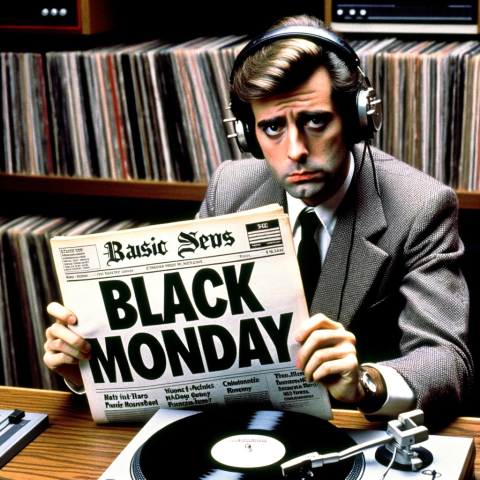The Impact of Black Monday on the Music Industry: October 20th, 1987
Well, well, well, if it isn’t October 20th, 1987. A day that will forever be etched in the annals of history as Black Monday. No, not because it was the day your favourite band broke up or the day disco died (again). But because it was the day the stock market took a nosedive, a plunge, a belly flop of epic proportions. Believe it or not, this financial fiasco had a profound impact on the music industry. So, grab your Walkman, pop in your favourite mixtape, and let’s take a trip down memory lane.
Now, you might be thinking, “What does the stock market have to do with my jam?” Well, dear reader, more than you might think. You see, the music industry, like any other, relies heavily on investments. Record labels, concert promoters, and even your favourite artists themselves need a steady flow of cash to keep the hits coming. When the stock market crashed, that flow turned into a trickle, and the music industry felt the pinch.
Suddenly, record labels were tightening their belts, cutting back on everything from artist development to marketing budgets. This meant fewer new artists getting signed, and those who were already on the roster were left to fend for themselves. It was a bit like being at a party where the host suddenly announced there was no more beer. Panic ensues, people start hoarding the pretzels, and someone inevitably starts a fight over the last slice of pizza.
But it wasn’t all doom and gloom. Some might argue that the financial crisis sparked a creative boom in the music industry. With less money to throw around, artists and labels had to get creative. They had to think outside the box, or in this case, outside the recording studio. This led to a surge in DIY recording and production, with artists taking matters into their own hands. It was a bit like the punk movement of the 70s but with fewer safety pins and more synthesizers.
And let’s not forget about the fans. With less disposable income, people were more selective about the music they bought. This led to a rise in popularity for indie labels and underground artists, who offered a cheaper alternative to the mainstream. It was a bit like choosing between a fancy restaurant and your local taco truck. Sure, the restaurant might have a Michelin star, but the taco truck has cheap, delicious food and a guy playing the guitar for tips.
So, there you have it. Black Monday, October 20th, 1987. A day that sent shockwaves through the financial world and the music industry. A day that forced artists, labels, and fans to adapt and innovate. A day that proved, once again, that music is more than just a business. It’s a way of life, a form of expression, and a source of resilience in the face of adversity. And if that’s not something to sing about, I don’t know what is.
So, here’s to you, Black Monday. You may have been a financial disaster, but you were also a catalyst for change, a spark of creativity, and a reminder that the music industry, like a good song, can weather any storm.

